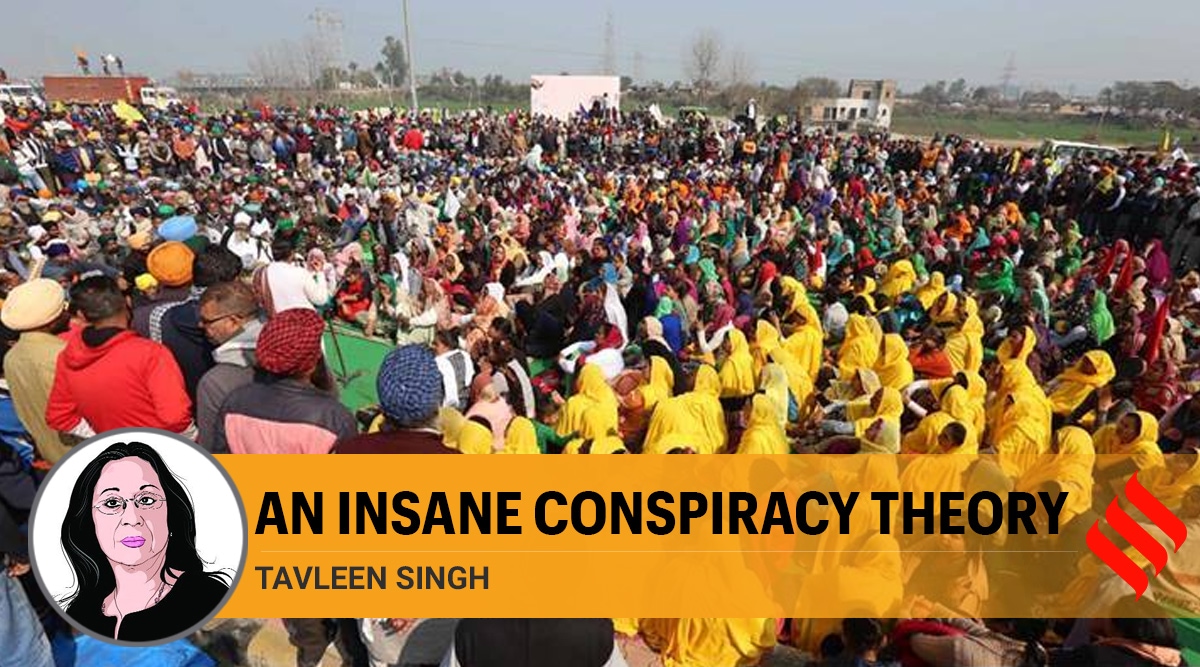Mishandling of farmers’ agitation has damaged PM Modi’s carefully cultivated image as a world statesman
Tavleen Singh writes: Instead of trying to shut down foreign voices it would be better for the Prime Minister to concentrate his energies on trying to win back the trust of our farmers.

As conspiracy theories go, this one takes the biscuit. We are to believe that Rihanna, Greta Thunberg and sundry other international celebrities are in league with Khalistani groups in a plot to destroy Indian democracy. If this theory were being spread by some lunatic, Hindutva fringe group, it would not find mention in this space. Sadly, it is being spread by senior officials in the Government of India and by BJP spokesmen. The Delhi Police, controlled by the Home Ministry, are so convinced of the truth of this bizarre theory that by the end of last week a case was registered against ‘unknown people’. It was based on a ‘toolkit’ for destroying India that was supposedly downloaded from the website of the teenage climate activist. The charges and the conspiracy are both absurd and hilarious, but they are being taken seriously in the most exalted corridors of the Government of India.
So seriously that the first response to Rihanna’s tweet supporting the farmers’ protest came from the Ministry of External Affairs. If she had been the president or prime minister of a major country this response would be appropriate. She is just a pop star. Was there any need to respond at all? The Government of India was so rattled by Rihanna’s tweet in support for the farmers that within hours the Home Minister had also leapt into the fray along with dazzling celebrities from Bollywood and the sports world like Sachin Tendulkar and Lata Mangeshkar. Kangana Ranaut, who flaunts her ‘bhakti’ for Modi on her sleeve spat out such venomous tweets in response to Rihanna that some had to be taken down.
To tell you the truth, my first response to this conspiracy theory was to laugh. Then I remembered that one of the things that I hear most on social media is that the reason why Narendra Modi is so beloved by his ‘bhakts’ is because they believe that he has helped them to feel ‘proud of being Indian’. When I first started to see comments of this kind on my Twitter timeline, I dismissed them as the ranting of goofs. One of the great achievements of the past 70 years is that Indians have learned to think of themselves as Indian and take pride in this. In those early years of our journey as a modern nation state this was not true.
In the first two decades of Independence political commentators routinely speculated about the breakup of India. Through the Eighties and Nineties there were secessionist movements in Kashmir and Punjab and in states on our northeastern border. By the time Modi became prime minister there was only one serious secessionist threat left, and that was in the former state of Jammu & Kashmir. This is why the abrogation of Article 370, with near unanimity in Parliament, had popular support. It had support in Ladakh and Jammu and perhaps even in the Kashmir Valley where ordinary people have suffered too long because of those who have been fighting violently for ‘azadi’. Many ordinary Kashmiris stopped supporting secessionist groups when an Islamic state in the Valley became their goal.
The point is that most Indians are proud of being Indian. So where have these Indians come from whose pride in being Indian has only developed after Modi became prime minister? They have come from the aggressive Hindutva that is today called ‘nationalism’. Its tenets are clear. Believers must detest Muslims and Pakistan. They must worship the Mother Cow and they must despise anyone who dares to criticise Modi or his policies. This is what passes for nationalism today and this is why those who dare protest against a new law or policy are immediately labelled anti-national.
The problem with the farmers’ agitation is that this labelling did not work. The farmers quickly made clear that it was their sons and brothers who were defending India’s borders. When the labelling strategy fell apart, it was as if the government of India lapsed into a period of confusion. It was during this period that the media was dragooned into supporting the government. Private news channels, some more servile than Doordarshan, continue to spread the word that the government has been flexible and the farmers obdurate. The chaos in Delhi on Republic Day they blame on the farmers, not on a failure of law enforcement. In the immediate wake of January 26 came signs of a crackdown on the Ghazipur border. Rakesh Tikait won that round. So instead of a crackdown what we see today is a strategy to barricade Delhi by fortifying its borders with trenches, razor wire and giant iron spikes that could rip the tires off tractors.
It is these barricades that have drawn international support for the farmers. Most people find it hard to understand why unarmed farmers should be treated as if they were enemy troops waiting to attack India. It is his mishandling of the farmers’ agitation that has damaged Narendra Modi’s carefully cultivated image as a world statesman. And it is because of this that even the tweet of a pop star has so rattled the confidence of the mighty Government of India that it is now spreading insane conspiracy theories. Instead of trying to shut down foreign voices it would be better for the Prime Minister to concentrate his energies on trying to win back the trust of our farmers.
Courtesy Indian Express




